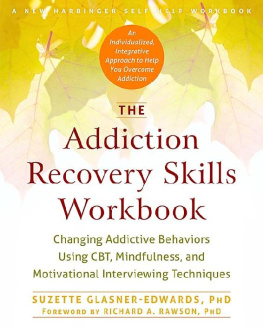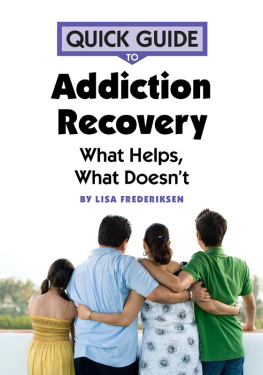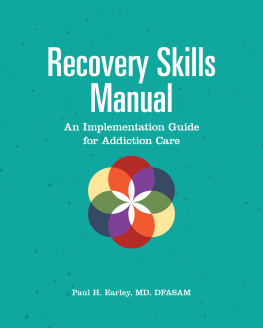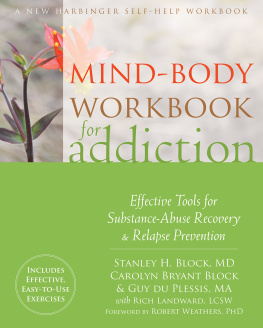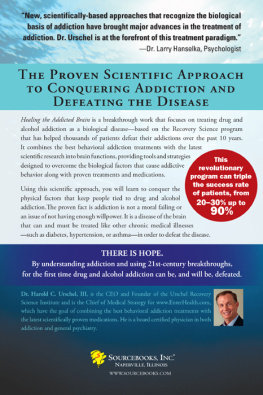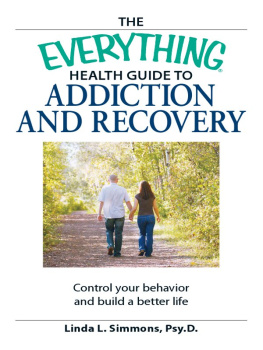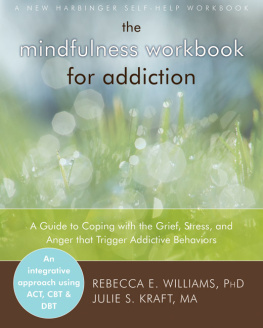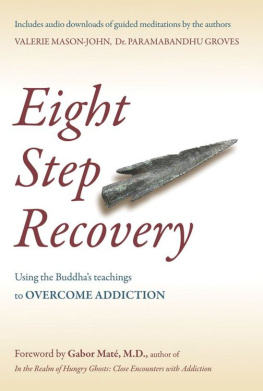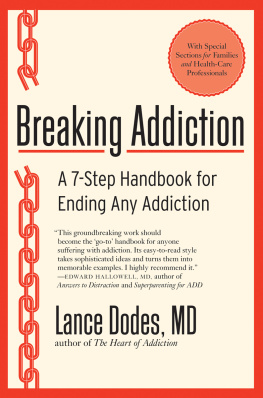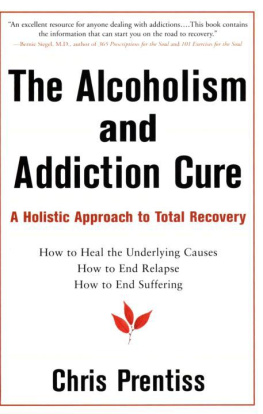
A cutting-edge, comprehensive, and interactive approach to the science of addiction recovery, written with great respect and compassion for the reader. Anyone struggling with the demons of addiction will find real help here, and hope.
Terri Cheney , author of the New York Times bestseller Manic
The Addiction Recovery Skills Workbook is an excellent translation of modern science into practical skills development. From explaining the basic brain changes associated with the development of addiction to laying out a systematic path to behavioral change and recovery, Glasner-Edwards has taken the very best of addiction science and turned it into common sense and step-by-step instructions. I think this workbook will be as important for families and friends of addicted individuals as for those affected directly. Either way, this is a powerful and practical tool to aid recovery.
A. Thomas McLellan , founder and chairman of the board of the Treatment Research Institute, and former deputy director of the White House Office of National Drug Control Policy
In creating The Addiction Recovery Skills Workbook, Glasner-Edwards has developed a resource that is at the cutting edge of recovery from addiction. In a respectful, direct, and clear way, she provides readers with key tools necessary to build the motivation to change, learn the skills needed to change, and apply those skills to achieving and maintaining change. Glasner-Edwards does a wonderful job of integrating the three most critical innovations in evidence-based approaches to treatment in the last fifty years: cognitive behavioral therapy (CBT), motivational enhancement, and mindful observation. There has been excellent research in all three areas demonstrating their value in aiding individuals in achieving their goals to be clean and sober, and Glasner-Edwards has created a resource that will be a wonderful tool for anyone addressing substance use problems. I anticipate this workbook will become a standard in the field.
John R. McQuaid, PhD , professor of clinical psychology at the University of California, San Francisco; associate chief of mental health for clinical administration at the San Francisco VA Medical Center; and coauthor of Peaceful Mind
As one of Americas most knowledgeable addiction scientists, Suzette Glasner-Edwards writes with clarity and authority about the state of the art of treatment for addiction, a devastating disease that affects millions of people and families. Glasner-Edwards explains the complex science of addiction in terms that everyone can understand. Most important, she provides guidance to help the afflicted overcome this illness. This book will help end the stigma of addiction and it will save lives.
David Sheff , journalist and New York Times best-selling author of Clean and the memoir Beautiful Boy
In this self-care book, Glasner-Edwards provides a much-needed addition to the substance abuse treatment field by providing a hopeful and highly accessible workbook for people struggling with substance abuse and addiction. This book explains the mystery of addiction and how to communicate with addiction treatment providers. It offers a range of interactive evidence-based therapy tools and techniques to achieve self-directed behavioral change. It integrates several important approaches, including cognitive behavioral therapy (CBT), mindfulness, and motivational interviewing, giving individuals powerful tools to tackle this devastating illness.
Karen Miotto, MD , clinical professor in the department of psychiatry and biobehavioral sciences at the University of California, Los Angeles (UCLA), and director of the UCLA Addiction Medicine Clinic
I have worked in clinical addictions research for over fifteen years, and I can honestly say that this is no ordinary self-help workbook. Glasner-Edwards has expertly integrated the powerful combination of cognitive behavioral therapy (CBT), motivational enhancement, and mindfulness into an easily digestible treatment package that speaks directly to the person with an addictive disorder. It does more than just present a how-to guide to the implementation of these key, cutting-edge treatment strategies, however. This workbook also contains clear advice as to how, when, and where to ask for help; provides a framework for what is to be expected in the recovery process; and contextualizes the treatment strategies with other traditional addictions programs (12-step, medication, etc.). These particular inclusions mean that the workbook cuts across traditional, well-known barriers people report when considering addictions treatment, such as the stigma and mystery about what might happen, and problems with inconsistent, incoherent care. By integrating solutions that run across a range of lifestyle factors (e.g., exercise, social network enhancement, communication) and common comorbidities (e.g., depression, anxiety), this workbook also stands to be personally relevant to anybody concerned about their substance use, at any stage of severity. By hitting all of these targets sensitively, respectfully, and comprehensively in this workbook, Glasner-Edwards has provided a real service to the addictions community. I am going to recommend this to all of my clinical colleagues!
Frances Kay-Lambkin , associate professor at the National Drug and Alcohol Research Centre at the University of New South Wales, Australia

Publishers Note
This publication is designed to provide accurate and authoritative information in regard to the subject matter covered. It is sold with the understanding that the publisher is not engaged in rendering psychological, financial, legal, or other professional services. If expert assistance or counseling is needed, the services of a competent professional should be sought.
Distributed in Canada by Raincoast Books
Copyright 2015 by Suzette Glasner-Edwards
New Harbinger Publications, Inc.
5674 Shattuck Avenue
Oakland, CA 94609
www.newharbinger.com
Exercise 7.4, SOBER Breathing, reprinted from MINDFULNESS-BASED RELAPSE PREVENTION FOR ADDICTIVE BEHAVIORS by Sarah Bowen, Neha Chawla, and G. Alan Marlatt, copyright 2010 by The Guilford Press. Reprinted with permission of The Guilford Press.
Cover design by Sara Christian
Acquired by Tesilya Hanauer
Edited by Susan LaCroix
All Rights Reserved
Library of Congress Cataloging-in-Publication Data
Glasner-Edwards, Suzette, author.
The addiction recovery skills workbook : changing addictive behaviors using CBT, mindfulness, and motivational interviewing techniques / Suzette Glasner-Edwards ; foreword by Richard A Rawson.
Includes bibliographical references.
ISBN 978-1-62625-278-3 (paperback) -- ISBN 978-1-62625-279-0 (pdf e-book) -- ISBN 978-1-62625-280-6 (epub) 1. Substance abuse--Treatment. 2. Addicts--Rehabilitation. 3. Psychotherapy. 4. Meditation--Therapeutic use. I. Title.
RC564.G45 2015
362.29--dc23
This book is dedicated to Lilly and Lila Edwards, for inspiring me to do all that I can to help people change; when we help one person heal, we slowly heal the world.
Contents
Richard A. Rawson, Ph.D.
I remember in the 1980s being told by a seasoned counselor that clients should not be educated about addiction, because it would allow them to feel like they could understand and control their drug use and this would interfere with their surrendering to their disease. For many years, addicted individuals in treatment programs were repeatedly told that they should shut up and just do what they were told. More recently, we hear celebrity endorsements for luxury treatment programs and quasi-religions which suggest that if you simply pay lots of money to these organizations and follow their science fiction or their narcissistically-inspired formulas, it is very possible to become cured and avoid the hard work of recovery. This is an attractive and seductive message, but an inaccurate oneit creates false hopes, but great profit margins. Both of these messages have been detrimental to the recovery efforts of many people.
Next page
